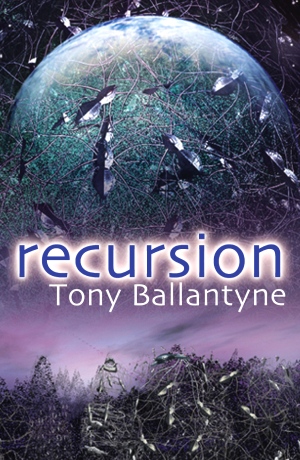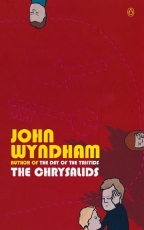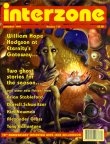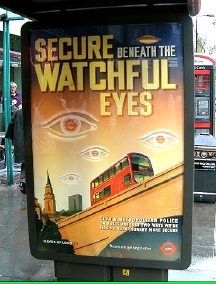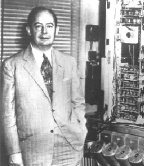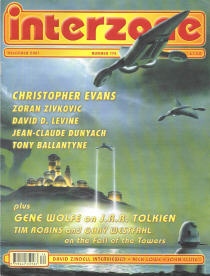Talking to The Machines
An Interview With Tony Ballantyne
The Agony Column for June 28, 2004
Interview Conducted by Rick Kleffel
An Interview With Tony Ballantyne
The Agony Column for June 28, 2004
Interview Conducted by Rick Kleffel
If you've been reading Interzone in the last six years, you've read a lot of Tony Ballantyne. And even a glance at the titles of his stories -- 'SOLDIER.EXE' and 'Teaching the War Robot to Dance' -- shows an interest in the AI/robotic end of the speculative fiction spectrum. This is borne out in his first novel, 'Recursion', a tale of the consequences of our current technological trends that's played out across three lives and stretching over 200 years into the future. Ballantyne's novel is funny, gripping, fascinating and certainly one of the best first novels -- if not simply one of the best novels thus far this year. I caught up with him via email to ask him about how this fantastic -- in all senses of the word -- novel came to be. RK: Tony, tell us a bit about yourself; that is, what you do that leaves you enough time to write, and what you might have been doing before you started writing. TB: I’m a teacher- I teach IT to 11-18 year olds. I love teaching, it’s never been something that I’ve done as stopgap whilst I tried to write, and it doesn’t actually leave me a lot of time for writing. I’m lucky enough to be very disciplined. I write solidly for one hour every night between 8 and 9pm. RK: What books first really drew your interest as a reader?
RK: What books first stimulated you as a writer, and when did you begin writing for yourself, and eventually an audience? TB: I can’t remember when I first started writing. I do know I started writing seriously when I read Diana Wynne Jones’s books for the first time. Every character she has written, no matter how minor, is a living, breathing person. More importantly, they all relate to each other. That’s how it seems me, anyway. The way she combined character and plot sparked something in me that I’ve been trying to emulate ever since. I’ve written for an audience from day one (which is not to say that that audience has always wanted to read it.) RK: You've been publishing stories in Interzone for six years now. Did David Pringle accept your first story, or did you have to cast about a bit? TB: No! I submitted lots of stories to David Pringle before he accepted one. I did have non-SF stories published before then. No one, I’m sure, forgets getting their first story published, but there was something special for me about selling my first SF short to Interzone. RK: Where else have you been published? TB: I’ve had stories in The Third Alternative and some anthologies. I’ve also had them reprinted in various European publications. Since I started writing the book and its follow up I have had less time to write shorts. It’s a shame in some ways, I really like the short story. RK: How does your career affect your writing? (If at all.) TB: It does give me ideas. I suppose that both writing and teaching are about getting your point across to people and trying to keep them interested in what you’re saying. RK: Do parts of any of the published stories show up in the novel? TB: Sort of. Herb’s story is largely based on a short that appeared in Interzone that I felt could go further. I always thought I was trying to get too much into too little space. The novel gave me a chance to expand the idea. Other shorts were also set in what became the Recursion universe. Writing the novel and its follow up have suggested some other short stories that I intend to get down later this year when I have met my current writing commitments.
TB: The chance to expand on ideas, to have more space for characters to develop. A friend suggested it was the obvious next way to develop as a writer: he was right. RK: 'Recursion' provides the perfect balance of science and fiction for a science fiction novel. How did you apportion the two? Was it conscious, or did you just spill it out onto the page -- or typewriter or word processor? TB: Thank you! That was the effect I was aiming for. How I did it though… I’m not sure, it was just something that evolved. I know that Eva was put in deliberately as a chance to develop a character, to stop the novel becoming a relentless battle of robots. I was also conscious of the fact that there should be no ‘heroes’ in the book, just ordinary people. I think that helped. RK: PC or Mac? Or Unix or Linux? TB: Oh, PC and Microsoft Office, but no ideological reasons for sticking with them. With people still starving to death in the world there are more important things to worry about than your OS.
TB: No, not really, or no more than anyone living in the West in the twenty first century. I think that SF readers are very aware of how past seemingly dark futures are positively embraced fifty years down the line. We’ve gone from a fear of Big Brother to a desire for surveillance. In Alan Moore’s V for Vendetta, the cameras had ‘For your Protection’ written underneath: a chilling joke twenty years ago. I get the impression that most people nowadays would see the sign as a reasonable comment. Maybe they’re even right. RK: You also speak quite eloquently of the thin line between concern for others and control of them, of how "I did it for your own good," is a frightening and potentially lethal thought. Could you talk about how one evolves into the other? TB: It happens from the day we are born. Our parents and teachers, and later our leaders and politicians make choices for us. The trouble begins, of course, when these people blindly assume that they know what is best. More subtle, though, is the human need to find someone to make the difficult decisions for us. You see it on a simple level when people read their star signs; you see it on another level when people base their opinions purely on statistical data or opinion polls. It takes courage to make decisions. RK: Cybernetic theory, computer programming and artificial intelligence themes are key points in this novel. How do you convert the often dry and quite potentially dull realms of theory into captivating fiction? TB: Thank you for the compliment, but I don’t know! I suppose it’s because I find those areas fascinating myself. You mean there are some people who don’t enjoy computer programming? RK: Space travel is not often a strong component of stories involving AI, and to be sure, AI theory and practice are not often strong components of stories involving space travel. 'Recursion' involves both. How did you strike this particular balance?
RK: 'Recursion' comes complete with a very nicely understated sense of humor and the absurd. Did the humor develop from the absurdity or was it vice versa? TB: The absurdity came first. I never set out to be humorous, but sometimes the absurdity of the situation just sets off the rest. I think that’s got to be the case in any extended work, otherwise all you’re left with is a string of jokes. RK: Your three main characters are all people the reader enjoys reading about. How did you shape them separately, and how much did they change as they came together? TB: I wanted to have three characters to reflect different strands of the plot, so Herb was originally a SF ‘geek’ and Constantine a family man. Like I said earlier, Eva was there to provide a change of pace. RK: The plot in 'Recursion' is quite intricate. Did you develop it first then write to an outline, or did the plot evolve from the characters and their situations? TB: Both. I did have to shape the three plot strands to make sure the story passed from one chapter to the next, but Eva got completely out of control and took on a life of her own that ended up changing the end of the book. She will be back. RK: Did you know how the three threads in the novel were going to join together when you started? TB: Roughly yes, but as I said, Eva was the thread that skewed the tapestry somewhat. RK: Once you finished the novel, how did you move it off of your computer and into the real world of publishing? Did you seek an agent or did you simply contact the publisher?
RK: Once the novel was finished, did it change significantly from the first draft? Did Peter Lavery over at Pan MacMillan/Tor UK help you shape the work? TB: Not so much in terms of plotting, though Mic Cheetham did make me sharpen up the ending, and quite rightly so. Peter Lavery is a superb editor. As well as tightening up the overall shape, he has a real feel for prose. He can improve a sentence immeasurably by moving just one word. RK: Who are you currently reading? TB: Mark Haddon, Justina Robson and Jean Aitchison. The last is Professor of Language and Communication at Oxford University. She writes on linguistics, and she is excellent. She puts forward complex ideas simply and always in a readable style. RK: What writers do you look to for new material? TB: Everyone, particularly those out of the genre. I also read a lot of non fiction, and usually have two books on the go at once, Fiction and Non Fiction. I like Eric Brown. He has a knack for making character driven SF look easy: it isn’t. RK: Are you interested in writing out of the science fiction genre? If so, what might you write? TB: Oh yes. I’ve got a mainstream novel half finished, and a romantic comedy planned out. RK: Most importantly, what's next? Tell us where to find your next short story and what kind of novel we can expect next. TB: My next short story will probably be Star!, appearing later this year in the 'Constellations' anthology, edited by Peter Crowther. The next novel is a follow up to 'Recursion'. It’s set twenty years after the first book, and picks up on threads that have hopefully gone unnoticed by the reader so far. |
